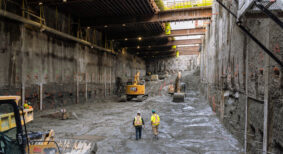In Ross Clair v. Canada (Attorney General), the Ontario Court of Appeal held that a contractor’s $1.437 million claim for extras was barred because the contractor had not provided sufficiently detailed information in support of its claim. The case turns on the specific wording of the contract at issue, but serves as a useful reminder for how claims for extras should be prepared and submitted by contractors and evaluated by owners and consultants.
Ross-Clair (contractor) was engaged by Her Majesty the Queen, Public Works and Government Services Canada (owner) to construct unit management offices for the Correctional Services of Canada. The contract outlined requirements for the approval of change orders and claims for extras.
With respect to claims for extras, the contract provided only two narrow instances in which extras were claimable – the discovery of substantially different soil conditions than those contained in the plans and specifications or neglect or delay of the owner in doing anything that the contract required of the owner. If an extra claim fit within one of those two categories, then the contract set out three pre-conditions for consideration of the extra. First, the contractor had to provide written notice of a claim for an extra to the project engineer (engineer) within 10 days of the discovery of changed soil conditions or neglect or delay of the owner. Second, the contractor had to give the engineer a written claim for extra expense or loss within 30 days of the final certificate of completion. Third, the contract specifically provided that the written claim for extras had to “contain a sufficient description of the facts and circumstances of the occurrence that is the substance of the claim to enable the engineer to determine whether or not the claim is justified”.
The central issue on appeal was whether the contractor had provided sufficient description of its $1.437 million extra claim to the engineer, requiring the engineer to make a determination of whether to allow the extra. The contractor had provided the engineer with a letter which cited delays due to site conditions, weather conditions, alterations to the contract and disruptions to the original sequence of construction. Enclosed with the letter was an “Additional Cost Summary” that listed its subcontractors and the additional costs attributed to their work which totalled the amount of the extra. The owner immediately took the position that the information provided was not of sufficient detail to permit the engineer to determine whether the claim was justified. The contractor applied to the court for a direction that the engineer consider the extra and provide a decision on the issue.
The Court of Appeal held that the requirement of the contractor to provide the engineer with a “sufficient description of the facts and circumstances” to enable the engineer to determine whether the claim was justified meant that the contractor was required to provide detailed information. The court noted that without detailed information, the engineer was not in a position to determine whether the claim for extras was justified. With respect to the exact nature of the detailed information required, the court turned to the contractual clauses dealing with change orders which explicitly required a cost breakdown identifying the costs of labour and material, each subcontract amount, and the amount of percentage mark-ups. The court noted that the contractor’s claim had failed to include “little if any” and “skeletal” support for the claim. Further, the contractor had not included any information relating to the nature and extent of the owner’s responsibility for the delay, whether compensation had already been paid on account of any extra expenses, and did not explain whether the extra fell within the two categories of permitted extras or the change order provisions of the contract. As insufficient detail was provided, the Court of Appeal held that the claim for extras was barred by the contract and the engineer was not required to consider the claim.
In arriving at its conclusion, the court noted that detailed information was required even though the engineer was intimately familiar with the project. In other words, where the contract requires detailed information, a contractor will not be able to argue that it was unnecessary to provide that to a project engineer who already knows the issues by virtue of their involvement in the project.
The court also noted that the fact that the owner and engineer had repeatedly asked the contractor to provide more information in support of its claim “solidified” the court’s conclusion that insufficient information was provided by the contractor. The suggestion that the owner and engineer’s position on the issue somehow confirms the court’s legal analysis is somewhat peculiar, but it does highlight the benefit of an owner and consultant clearly documenting what it considers to be non-compliance with contractual terms in writing.
The disallowance of a $1.437 million extra claim without any assessment of the legitimacy of the actual claim is a harsh result, but one that is in perfect compliance with the court’s interpretation of this contract. This decision highlights the importance of ensuring that all contractual terms for the submission of extras and change orders are carefully complied with. Contractors, consultants, and owners should look at the entire contract for clues as to the type of information that should be included in extra claims. Detailed information, to the extent that it is available, should be provided in full and within any timelines set out in the contract. Finally, where the consultant or owner is not convinced that the information provided is sufficient to meet the contractual requirements, that should be clearly documented in writing.
Rebecca Cleary is a member of the construction and engineering practice at the law firm of Alexander Holburn Beaudin + Lang LLP.









